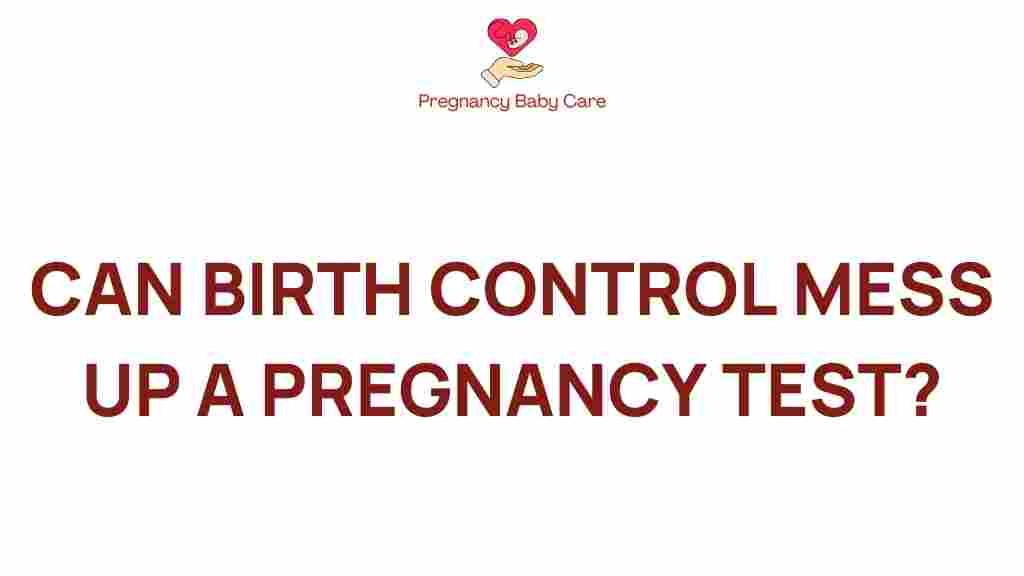Can Birth Control Interfere With Your Pregnancy Test Results?
Understanding how birth control affects pregnancy tests is crucial for those relying on hormonal contraceptives. Many women wonder if their birth control methods could lead to inaccurate pregnancy test results, particularly false negatives. This article delves into the relationship between birth control, pregnancy tests, and hormonal contraceptives, providing insights into how they may influence pregnancy detection.
Introduction
Birth control is a common method used to prevent pregnancy, but its effect on pregnancy tests is often misunderstood. Many women trust these tests to confirm or rule out pregnancy when they experience symptoms or miss a period. However, it is essential to understand whether hormonal contraceptives could potentially interfere with the accuracy of these tests. This article will clarify these concerns and provide actionable steps for reliable pregnancy detection.
How Pregnancy Tests Work
Before diving into how birth control might affect pregnancy tests, it’s essential to understand how these tests function. Pregnancy tests typically detect the presence of human chorionic gonadotropin (hCG) in urine or blood. hCG is a hormone produced shortly after a fertilized egg implants in the uterus. Here’s how the process works:
- After conception, the body starts to produce hCG.
- This hormone can be detected in urine or blood a few days after implantation.
- Pregnancy tests are designed to measure the levels of hCG to determine if a woman is pregnant.
Types of Birth Control and Their Effects
There are various types of birth control methods, including hormonal contraceptives such as:
- Birth control pills
- Intrauterine devices (IUDs)
- Implants
- Injectables (like Depo-Provera)
Each of these methods works differently to prevent pregnancy, primarily by inhibiting ovulation, thickening cervical mucus, or altering the uterine lining. But how do they interact with pregnancy tests?
Can Birth Control Cause False Negatives in Pregnancy Tests?
The short answer is no; hormonal contraceptives do not directly cause false negatives in pregnancy tests. However, several factors could contribute to this misunderstanding:
- Timing: If you take a pregnancy test too early, the levels of hCG may not be high enough to detect, leading to a false negative.
- Test Sensitivity: Different tests have varying sensitivities; some may require higher hCG levels to produce a positive result.
- Improper Use: Not following the instructions for the test can result in inaccurate readings.
- Hormonal Fluctuations: Hormonal birth control can sometimes cause irregular periods, leading to confusion about when to test.
Step-by-Step Process for Accurate Pregnancy Testing
To ensure you get the most accurate results from your pregnancy test, follow these steps:
- Wait for the Right Time: Test at least one week after your missed period for the most reliable results.
- Choose the Right Test: Select a pregnancy test known for its sensitivity to hCG.
- Follow Instructions Carefully: Read and follow the instructions provided with the pregnancy test.
- Use Morning Urine: The first urine of the day typically contains the highest concentration of hCG.
Common Misconceptions About Birth Control and Pregnancy Tests
Several myths surround the interaction between birth control and pregnancy tests. Here are some of the most common misconceptions:
- Myth: Birth control can alter the pregnancy test results.
Fact: Hormonal contraceptives do not contain hCG and do not interfere with the test’s ability to detect it. - Myth: If you’re on birth control, you can’t get pregnant.
Fact: While birth control is effective, no method is 100% foolproof, and pregnancy can occur. - Myth: Missed periods on birth control are a guarantee of pregnancy.
Fact: Hormonal contraceptives can cause missed or irregular periods, which may not indicate pregnancy.
Troubleshooting Tips for Pregnancy Testing
If you suspect you might be pregnant but are receiving negative tests, consider these troubleshooting tips:
- Retest After a Few Days: If you receive a negative result but still suspect pregnancy, wait a few days and test again.
- Consult Your Doctor: If you continue to have unusual symptoms, consult a healthcare professional for further evaluation.
- Consider Blood Tests: A blood test conducted by a healthcare provider can provide more accurate results than home urine tests.
When to Seek Medical Advice
If you experience any of the following symptoms along with negative pregnancy tests, it might be time to contact your healthcare provider:
- Severe abdominal pain
- Heavy bleeding
- Persistent nausea or vomiting
- Unusual fatigue
These symptoms could indicate an underlying issue that requires medical attention, regardless of the pregnancy test results.
Conclusion
In conclusion, while birth control methods, particularly hormonal contraceptives, are effective in preventing pregnancy, they do not interfere with the accuracy of pregnancy tests. Understanding how pregnancy detection works and following the recommended steps can help ensure reliable results. If you have doubts about your pregnancy status, it is always best to consult with a healthcare professional. For more information on pregnancy tests and hormonal contraceptives, you can visit this resource.
Remember, if you have any concerns regarding your birth control method or its effectiveness, speaking to your healthcare provider can provide clarity and peace of mind.
This article is in the category Pregnancy and created by PregnancyBabyCare Team
